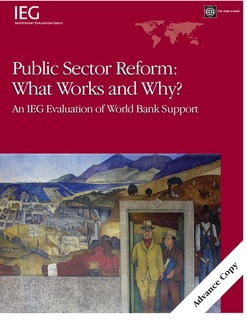Public Sector Reform: What Works and Why?
Research report
Permanent lenke
http://hdl.handle.net/11250/2474527Utgivelsesdato
2008-05-24Metadata
Vis full innførselSamlinger
- Publications [1488]
Originalversjon
Washington DC: World Bank (IEG Evaluation Report) 90 p.Sammendrag
The main objective of this evaluation by the Independent Evaluation Group (IEG) is to help the World Bank learn how to contribute more effectively to public sector reform (PSR) in its member countries. The intended audience also includes government officials and other stakeholders that want to see what lessons are available for improving project and program design. The World Bank has devoted an increasing share of its lending and advisory support to the reform of central governments, so it is important to understand what is working, what needs improvement, and what is missing. The evaluation examines lending and other kinds of Bank support in the period 1999-2006 for public sector reform in four areas: public financial management, administrative and civil service, revenue administration, and anticorruption and transparency. The public sector is the largest spender and employer in virtually every developing country and it sets the policy environment for the rest of the economy. About one-sixth of World Bank projects in recent years have supported public sector reform. Improving the efficiency of government counterparts is also essential for the effectiveness of the Bank's support for development. Some findings: Although a majority of countries that borrowed to support public sector reform experienced improved performance in some dimensions, there were shortcomings in important areas and in overall coordination. The frequency of improvement was higher among IBRD borrowers than among IDA borrowers. Performance usually improved for public financial management, tax administration, and transparency, but did not usually with respect to civil service. Direct measures to reduce corruption - such as anticorruption laws and commissions - rarely succeeded. Some recommendations: Design PSR projects and allocate World Bank resources to them with recognition that PSR has especially complex political and sequencing issues. Be realistic about the time it takes
